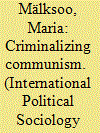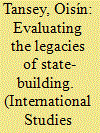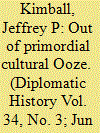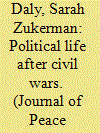| Srl | Item |
| 1 |
ID:
130988


|
|
|
|
|
| Publication |
2014.
|
| Summary/Abstract |
The Eastern enlargement of the European Union has intensified calls for the reconstruction of a common European remembrance of the continent's multiple totalitarian legacies. Various political initiatives to condemn, along with counter-attempts to re-legitimize, the legacy of communism have emerged at the pan-European level. Each aspires to leave an imprint on the symbolic moral order and the legal regime of the broader European community. This article builds a conceptual framework for understanding the contestation of political and juridical regulation of the transnational remembrance of totalitarian communist regimes in Europe. Critically engaging the concept of cosmopolitanization of memory, it is argued that mnemonic identity in Europe is being transformed via new claims on "European memory." These claims are being made by various East European actors seeking recognition of the region's particular historical legacies as part of the pan-European normative verdict on twentieth-century totalitarianisms.
|
|
|
|
|
|
|
|
|
|
|
|
|
|
|
|
| 2 |
ID:
131008


|
|
|
|
|
| Publication |
2014.
|
| Summary/Abstract |
What impact do international state-building missions have on the domestic politics of states they seek to build, and how can we measure this impact with confidence? This article seeks to address these questions and challenge some existing approaches that often appear to assume that state-builders leave lasting legacies rather than demonstrating such influence with the use of carefully chosen empirical evidence. Too often, domestic conditions that follow in the wake of international state-building are assumed to follow as a result of international intervention, usually due to insufficient attention to the causal processes that link international actions to domestic outcomes. The article calls for greater appreciation of the methodological challenges to establishing causal inferences regarding the legacies of state-building and identifies three qualitative methodological strategies-process tracing, counterfactual analysis, and the use of control cases-that can be used to improve confidence in causal claims about state-building legacies. The article concludes with a case study of international state-building in East Timor, highlighting several flaws of existing evaluations of the United Nations' role in East Timor and identifying the critical role that domestic actors play even in the context of authoritative international intervention.
|
|
|
|
|
|
|
|
|
|
|
|
|
|
|
|
| 3 |
ID:
096610


|
|
|
| 4 |
ID:
180203


|
|
|
|
|
| Summary/Abstract |
Around the world, following civil wars, rebel and government belligerents contest and win the founding postwar elections. Despite the prevalence of these elections and their importance in setting post-conflict environments on specific political trajectories, their outcomes have been understudied. Existing scholarship centers on the timing and institutions of the postwar elections, but not on their party and voter participants. This article introduces a dataset which traces the postwar political trajectories of civil war belligerents, identifies their successor parties, charts their electoral performance, and documents their decision to remilitarize or demilitarize. The Civil War Successor Party (CWSP) dataset covers all belligerents that have transitioned from civil conflict in the period 1970–2015. The article describes the contours of the dataset, reveals patterns of political life after wars, and outlines the potential uses of the dataset for future research. In particular, it suggests how the data may be leveraged by scholars and practitioners to understand dynamics of political behavior, patterns of governance and public goods provision, quality of democracy, and recurrence of low- and high-intensity war in the aftermath of mass violence.
|
|
|
|
|
|
|
|
|
|
|
|
|
|
|
|